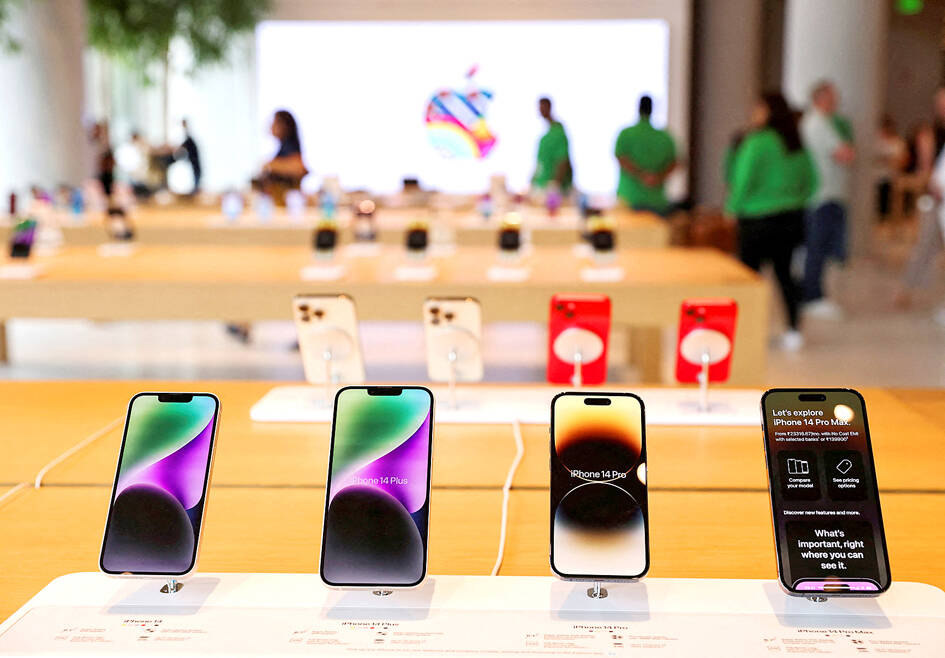Apple Inc’s iPhone dethroned Samsung Electronics Co devices to become the best-selling smartphone series last year, the first time South Korea’s largest company has lost the top spot since 2010.
The iPhone accounted for one-fifth of the global market with close to 235 million units last year, research firm International Data Corp (IDC) said.
Samsung, whose shipments slumped by a double-digit percentage to 226.6 million units, was second, ahead of Chinese device makers such as Xiaomi Corp (小米).

Photo: Reuters
While Apple has dominated the holiday quarter in recent years, its surge ahead of Samsung over a full year is unprecedented and suggests Apple is weathering an industry-wide slump better than rivals.
Apple benefited from aggressive offers that have enticed a shift toward premium devices. It expanded shipments last year despite a lukewarm reception late in the year for the iPhone 15 in China — its biggest international market — where Huawei Technologies Co’s (華為) growing popularity and a widening ban on government use is depressing sales.
“While we saw some strong growth from low-end Android players like Transsion (傳音) and Xiaomi in the second half of 2023, stemming from rapid growth in emerging markets, the biggest winner is clearly Apple,” IDC research director Nabila Popal said. “All this despite facing increased regulatory challenges and renewed competition from Huawei in China, its largest market. Apple’s ongoing success and resilience is in large part due to the increasing trend of premium devices, which now represent over 20 percent of the market.”
The shift up the smartphone price chain has been driven in part by attractive trade-in offers and interest-free financing, IDC said.
Apple was the only player in the global top three to register growth, of 3.7 percent, but it has not been immune to the wider decline. Sales in China of the latest iPhone are significantly down from its predecessor, with some analyst expecting those drops to deepen.

Taiwan Semiconductor Manufacturing Co (TSMC, 台積電) would not produce its most advanced technologies in the US next year, Minister of Economic Affairs J.W. Kuo (郭智輝) said yesterday. Kuo made the comment during an appearance at the legislature, hours after the chipmaker announced that it would invest an additional US$100 billion to expand its manufacturing operations in the US. Asked by Taiwan People’s Party Legislator-at-large Chang Chi-kai (張啟楷) if TSMC would allow its most advanced technologies, the yet-to-be-released 2-nanometer and 1.6-nanometer processes, to go to the US in the near term, Kuo denied it. TSMC recently opened its first US factory, which produces 4-nanometer

GREAT SUCCESS: Republican Senator Todd Young expressed surprise at Trump’s comments and said he expects the administration to keep the program running US lawmakers who helped secure billions of dollars in subsidies for domestic semiconductor manufacturing rejected US President Donald Trump’s call to revoke the 2022 CHIPS and Science Act, signaling that any repeal effort in the US Congress would fall short. US Senate Minority Leader Chuck Schumer, who negotiated the law, on Wednesday said that Trump’s demand would fail, while a top Republican proponent, US Senator Todd Young, expressed surprise at the president’s comments and said he expects the administration to keep the program running. The CHIPS Act is “essential for America leading the world in tech, leading the world in AI [artificial

REACTIONS: While most analysts were positive about TSMC’s investment, one said the US expansion could disrupt the company’s supply-demand balance Taiwan Semiconductor Manufacturing Co’s (TSMC, 台積電) new US$100 billion investment in the US would exert a positive effect on the chipmaker’s revenue in the medium term on the back of booming artificial intelligence (AI) chip demand from US chip designers, an International Data Corp (IDC) analyst said yesterday. “This is good for TSMC in terms of business expansion, as its major clients for advanced chips are US chip designers,” IDC senior semiconductor research manager Galen Zeng (曾冠瑋) said by telephone yesterday. “Besides, those US companies all consider supply chain resilience a business imperative,” Zeng said. That meant local supply would

Servers that might contain artificial intelligence (AI)-powering Nvidia Corp chips shipped from the US to Singapore ended up in Malaysia, but their actual final destination remains a mystery, Singaporean Minister for Home Affairs and Law K Shanmugam said yesterday. The US is cracking down on exports of advanced semiconductors to China, seeking to retain a competitive edge over the technology. However, Bloomberg News reported in late January that US officials were probing whether Chinese AI firm DeepSeek (深度求索) bought advanced Nvidia semiconductors through third parties in Singapore, skirting Washington’s restrictions. Shanmugam said the route of the chips emerged in the course of an